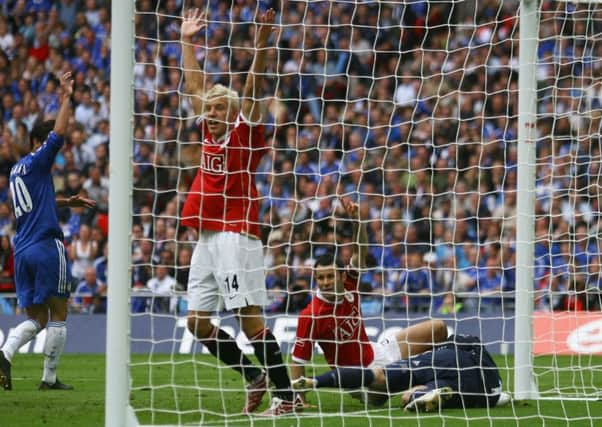Ryan Giggs still sore over FA Cup final '˜goal' for Manchester United


Giggs’ former club Manchester United and Chelsea meet at Wembley tomorrow – the first FA Cup final to use the Video Assistant Referee (VAR) system.
The two clubs last met in an FA Cup final in 2007 when Chelsea striker Didier Drogba struck the winner four minutes from the end of extra-time. But Giggs insists to this day that his close-range effort in the first period of the added half hour, when he slid on to a Wayne Rooney cross, should have stood.
Advertisement
Hide AdAdvertisement
Hide AdHad VAR been in operation then, United might well have gone ahead in a cagey game of few chances.
“I did score!” said Giggs. “It was over the line – and that’s what I always say about goal-line technology.
“We need it because I would have been an FA Cup final winner.
“I actually got fouled as it was coming across, I was about to tap it in and I got clipped. But I managed to get a bit on the ball.
“Petr Cech scooped it out, but it was over the line.”
Meanwhile, a combination of Manchester United’s global fame and the Premier League’s allure to broadcasters means United can make money regardless of results on the pitch, the club’s vice-chairman Ed Woodward, below, has claimed.
During United’s quarterly conference call with shareholders yesterday, Woodward was asked if the improved performance in the Premier League this season had played a part in another bumper set of financial numbers for the world’s richest club.
Woodward replied: “Playing performance doesn’t really have a meaningful impact on what we can do on the commercial side of the business.”
Overall, the club generated £137.5 million in total revenue in the first three months of 2018, the third quarter of the club’s financial year, which is an increase of more than £10m, or 8.1 per cent, on the same period last year. The main reason for this hike was that United had an extra home game and two more games televised live in this quarter than in the corresponding period in 2017.
Advertisement
Hide AdAdvertisement
Hide AdBut there were also healthy uplifts in revenue from the club’s numerous sponsorships around the world, ticket sales, hospitality packages and merchandise, with Alexis Sanchez’s arrival in January providing a boost.
What this is likely to add up to, Woodward said, was total annual revenues to the end of June of between £575-585m and underlying profits of around £175m.
He also underlined the vitality of the club’s various media ventures, with MUTV subscriptions up, the club app top of the charts in 36 countries, a revamped website on the way and YouTube’s fastest growing sports team channel.
“After the first week it went past the Dallas Cowboys and after the second it overtook the New York Yankees – it’s bigger than any US sports team’s channel,” Woodward told his largely American audience.
Woodward reminded the investors that five of the seven packages of UK broadcast rights had been sold, with two more packages of 20 games a season each still to go because they did not reach their list price in February’s auction. There was “no update” on their sale but the indication was the total revenue from all seven packages was likely to be a “slight reduction” on the £5.1 billion achieved in 2015 for the current three-year deal.
Woodward also alluded to recent stories about a mysterious £18.5bn investment in a revamped Club World Cup, to which Fifa would like to invite United.
“The merits and details are currently being considered by Fifa and other stakeholders,” he said, having just returned from a meeting on Wednesday in Lyon where a Uefa panel expressed its strong concerns about the plan. “However, it supports the view that OTT platforms [streaming services such as Netflix] will be the future of content consumption and live compelling content will be a key battleground.”
“Content generators are uniquely placed to be the beneficiaries and we continue to believe live streaming content will become increasingly more valuable.”